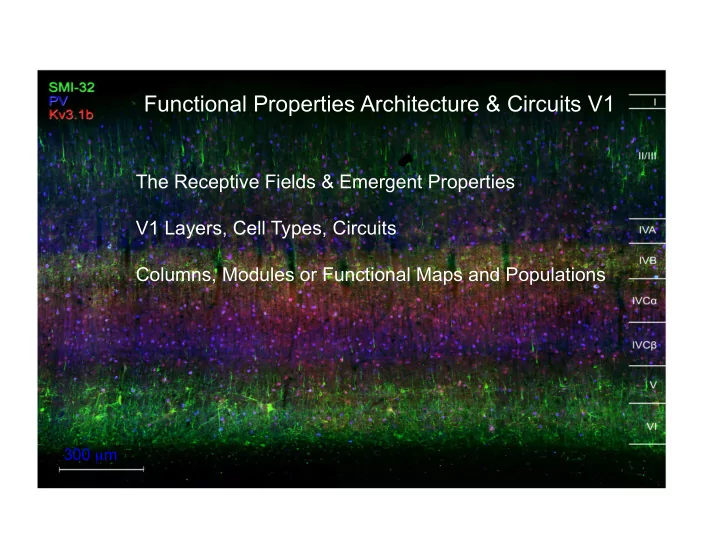

Functional Properties Architecture & Circuits V1 The Receptive Fields & Emergent Properties V1 Layers, Cell Types, Circuits Columns, Modules or Functional Maps and Populations 300 µ m
Magno – 10% Parvo – 80% Konio < 10% Total afferents > 1,000,000 per optic nerve
consider V1 How are the inputs organized? Is there segregation? Volume ~ 1,400 mm 3 Density (neurons) ~ 200 x 10 3 /mm 3 Total neurons 280,000,000
Hubel & Wiesel 1976
LGN properties (primate) Parvo/Magno/Konio distinctions R-G opponent/non-opponent/B- Y opponent SF tuning Low/High/? Achromatic Contrast gain Long/short/Long latency and integration times V1 properties Sustained/transient/? – low/ Selectivity bandpass TF tuning Orientation, direction, SF, TF, size Selectivity (eCRF), binocular disparity, chromatically double opponent Unselective for orientation, direction, spatial freq (SF), temp Different populations with different Freq (TF) degrees of selectivity along a range of stimulus dimensions
Functional Characterization Layer 4c alpha Simple Cells
Functional Characterization Layer 6 DS Complex Cell
RF Maps, orientation, SF and TF tuning: simple cells in layer 4b
Maps, SF and Orientation Tuning for Single Color Opponent Neuron from L6 Johnson et al 2008
Maps, SF and Orientation Tuning for Double Color Opponent Neuron from L6 O/P ratio 0.2 Johnson et al 2008
Disparity Selectivity of Neurons in Disparity Selectivity of Neurons Cat Monkey V1, V2, MT & MST : from Area 17 : from Barlow, Blakemore Parker 2007 and Pettigrew 1967
• CRF: orientation, spatial frequency, temporal frequency, direction, contrast, color, size -- area • eCRF: modulates the CRF responses -- influence that is the CONTEXT Blakemore & Tobin Allman et al DeAngelis, Ozhawa, Freeman Knierim & Van Essen Lamme, Ziper et al Sengpiel et al Cavanaugh et al . Williford & von der Heydt (2013) • What is the relationship to perception? • Relationship to normalization and attention • Feedback and modulation in population coding and modeling
From DeFelipe, 2005
Layers, Columns, Cell Types and Circuits • Laminar organization of cortex • Ocular Dominance • Cell Types, excitatory, inhibitory • Circuits and projections
300 µ m
CO blobs and stripes (Sincich & Horton 2005) thin thick inter V2 ---- V1
Intracolumnar feedforward and feedback connections (Sincich & Horton 2005)
Projections from V1 to V2 in primate Federer et al 2013
Segregated color selective inputs (from Chatterjee & Callaway, 2003)
Tripartite view of V1--V2 (Livingstone-Hubel)
The canonical cortical micro- circuit from Martin & Douglas 2010
Radial and Lateral connections (from Lund et al 2003)
Layer 4c β projections
Layer 4c α projections
Lateral connections in layer 2/3
Layer 2 projections Layer 5 projections From Wiser & Callaway 1996
Layer 6 Classes and projections
From Rudy et al 2010
Inhibitory interneurons in Primate V1 From Defelipe 1999
Recommend
More recommend